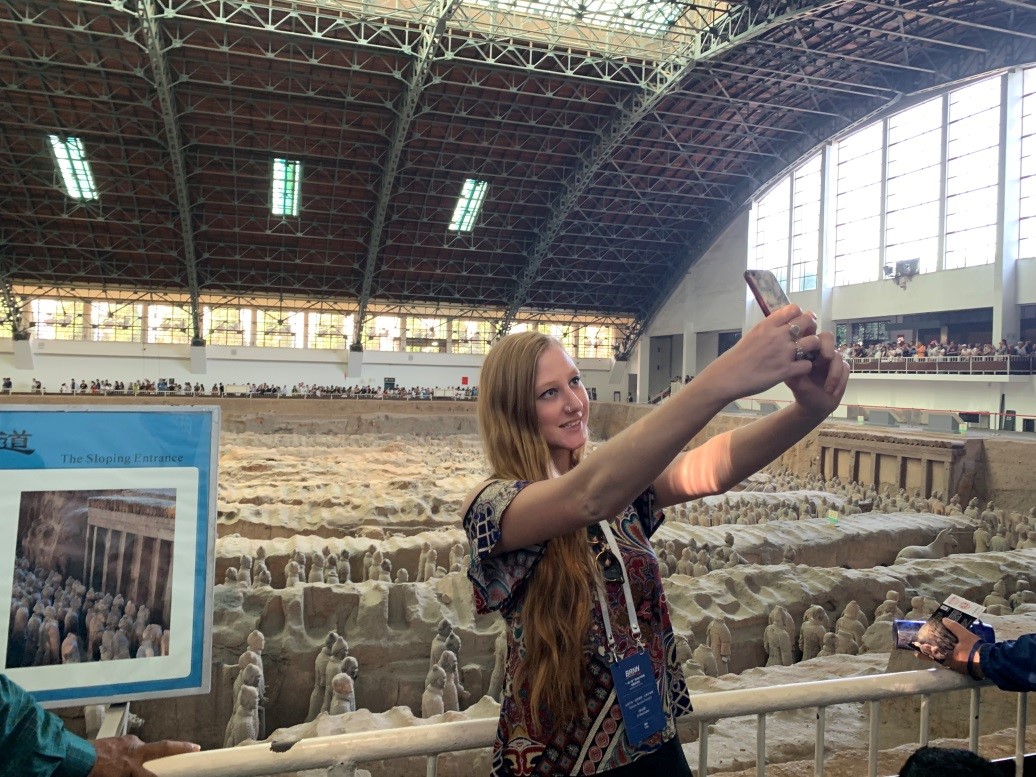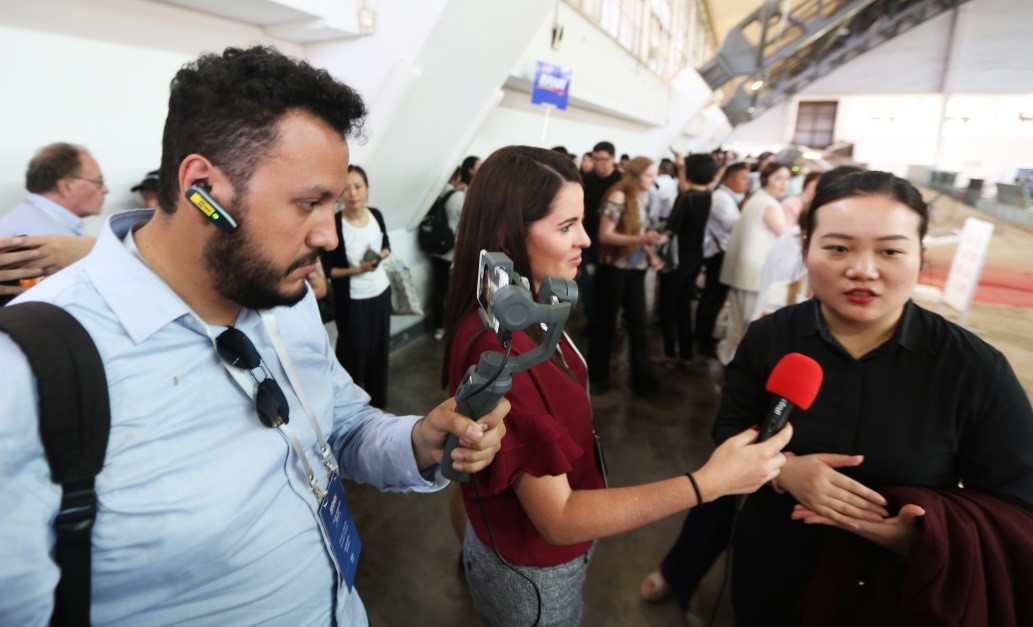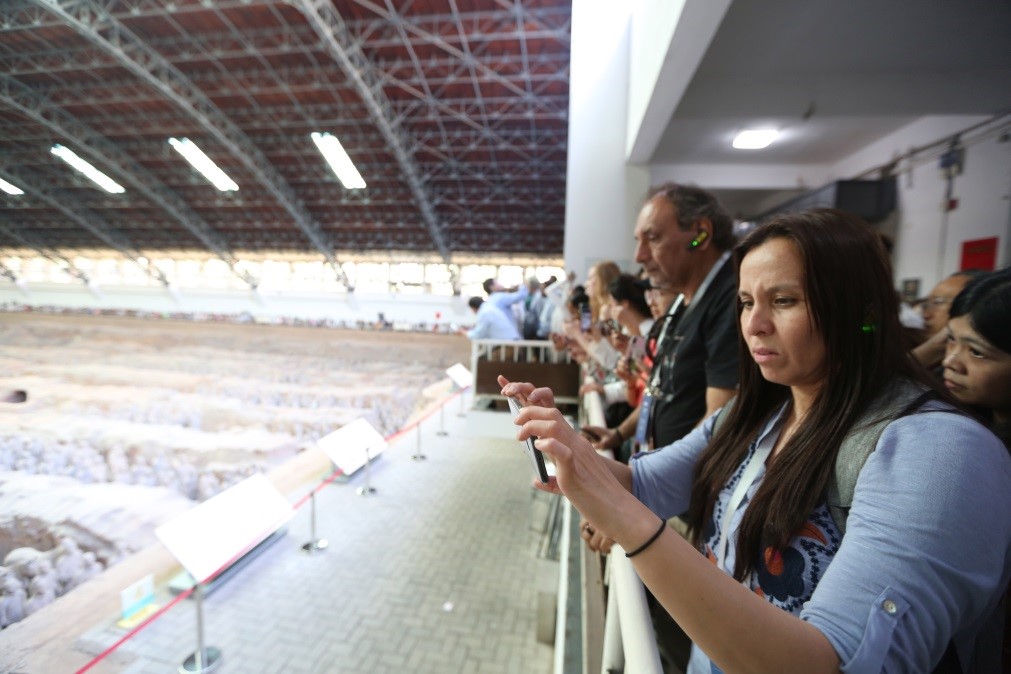


Valeria Alejandra, a Chilean subeditor with El Mostrador, takes a selfie with the terracotta army. (People's Daily, Zhang Bolan)
Foreign journalists participating in a workshop for the Belt and Road News Network (BRNN) paid a visit to the Emperor Qinshihuang's Mausoleum Site Museum in Xi'an, northwest China's Shaanxi province on Sept. 21, to zoom in on ancient Chinese culture.
"For me, it's like a dream come true," said Armando Mayorga, Manage Editor with La Nación in Costa Rica. He still remembers how the terracotta army at the mausoleum site caused a sensation in the entire world when it was first discovered in the 20th century. Mayorga said he had wanted to see the terracotta warriors ever since then.
The facial expressions on the terracotta warriors seem so real that it is hard to believe that the Chinese people already had such impressive skills thousands of years ago, said Mayorga.
The terracotta army at the tomb of Emperor Qinshihuang serves as a bridge that brings the Chinese culture to the world. China is far away for people in Latin America. But the media workshop provides a platform for the journalists there to see the real China through first-hand experience in cities like Beijing and Xi'an, said Valeria Alejandra, a Chilean subeditor with El Mostrador.

A journalist in the media workshop has an interview at the Emperor Qinshihuang's Mausoleum Site Museum. (People's Daily, Liu Long)
Alejandra pointed out that media is important for the exchanges between civilizations. She hopes people in Latin America will have a better knowledge of Chinese culture through their reports.
The Spanish journalist Clara Navío with La Razón felt the same way. She believes the terracotta warriors are the messengers of Chinese culture.
Navío thinks it important for different cultures to communicate with one another. If people from different countries and regions isolate themselves from the outside world, the world will be put in danger.

While visiting the tomb site, Marcelo Cantelmi, Editor- in-Chief of the Foreign Desk with Clarin Newspaper, Argentina, learned about the history and conservation details about the terracotta warriors from the guide of the museum. He described the underground army as "beyond the imagination".
He hopes to have a deeper understanding of the Chinese culture and introduce China to Latin Americans in a comprehensive way.
"I see the long history of China well kept in the terracotta army," said Graciela Vallarino, General Manager of Multimedio La República, Uruguay, "We need to learn to respect the history like the Chinese people. Only by respecting the past can we usher in a brighter future."
 Fire brigade in Shanghai holds group wedding
Fire brigade in Shanghai holds group wedding Tourists enjoy ice sculptures in Datan Town, north China
Tourists enjoy ice sculptures in Datan Town, north China Sunset scenery of Dayan Pagoda in Xi'an
Sunset scenery of Dayan Pagoda in Xi'an Tourists have fun at scenic spot in Nanlong Town, NW China
Tourists have fun at scenic spot in Nanlong Town, NW China Harbin attracts tourists by making best use of ice in winter
Harbin attracts tourists by making best use of ice in winter In pics: FIS Alpine Ski Women's World Cup Slalom
In pics: FIS Alpine Ski Women's World Cup Slalom Black-necked cranes rest at reservoir in Lhunzhub County, Lhasa
Black-necked cranes rest at reservoir in Lhunzhub County, Lhasa China's FAST telescope will be available to foreign scientists in April
China's FAST telescope will be available to foreign scientists in April "She power" plays indispensable role in poverty alleviation
"She power" plays indispensable role in poverty alleviation Top 10 world news events of People's Daily in 2020
Top 10 world news events of People's Daily in 2020 Top 10 China news events of People's Daily in 2020
Top 10 China news events of People's Daily in 2020 Top 10 media buzzwords of 2020
Top 10 media buzzwords of 2020 Year-ender:10 major tourism stories of 2020
Year-ender:10 major tourism stories of 2020 No interference in Venezuelan issues
No interference in Venezuelan issues
 Biz prepares for trade spat
Biz prepares for trade spat
 Broadcasting Continent
Broadcasting Continent Australia wins Chinese CEOs as US loses
Australia wins Chinese CEOs as US loses